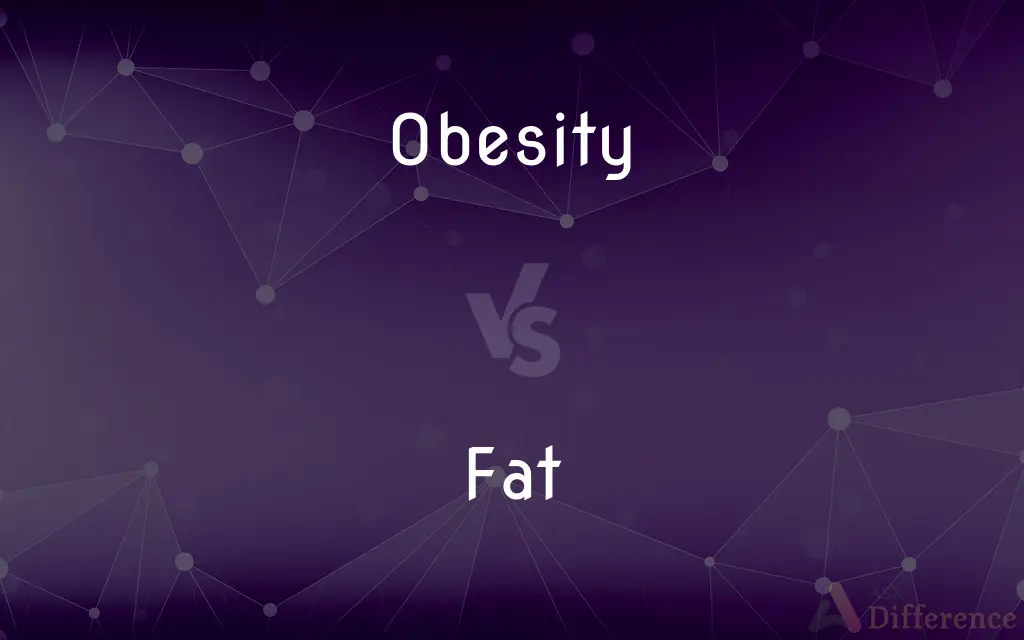Obesity vs. Fat — What's the Difference?
By Tayyaba Rehman — Updated on October 30, 2023
Obesity is a medical condition of excessive body fat, often measured by BMI. Fat refers to the natural oily substance in bodies, essential but harmful in excess.

Difference Between Obesity and Fat
Table of Contents
ADVERTISEMENT
Key Differences
Obesity is a health condition defined by an excessive amount of body fat, which can negatively impact health. It’s often assessed using body mass index (BMI). Fat, in contrast, is a natural component of the human body, essential for energy storage, insulation, and protection of organs.
The term obesity is specifically used in medical contexts to describe a condition that increases the risk of various health problems, such as heart disease, diabetes, and hypertension. Fat, however, is a broader term that can refer to both the substance (lipids) in the body and the dietary nutrient.
While all obese individuals have excess fat, not all body fat is indicative of obesity. For example, athletes may have a higher percentage of body fat but are not necessarily obese. Fat is a normal and essential part of bodily composition; it only becomes a health concern when in excess.
Obesity is generally seen as a health issue needing medical attention and lifestyle changes. Fat, on the other hand, is a more neutral term, though it can carry negative connotations in certain social contexts. It's important to distinguish between the necessary fat for bodily functions and the excess fat linked to obesity.
Comparison Chart
Definition
Medical condition of excess body fat
Natural substance in body for energy, insulation
ADVERTISEMENT
Measurement
Often assessed by BMI
Measured by body fat percentage
Health Implications
Linked to various health risks
Essential in moderation, harmful in excess
Context of Use
Medical, health-focused
Biological, nutritional, sometimes social
Relation to Normal Body Composition
Indicates imbalance, excess
Part of normal body composition
Compare with Definitions
Obesity
A state with increased risk for various diseases and health conditions.
Obesity is closely linked with type 2 diabetes.
Fat
A natural oily substance occurring in animal bodies, especially when deposited as a layer under the skin.
A balanced diet requires a certain amount of healthy fat.
Obesity
Excessive fat accumulation that presents a risk to health.
Programs aimed at reducing obesity focus on diet and exercise.
Fat
Substance in food, consisting of lipids, often linked to weight gain when consumed excessively.
She reduced her fat intake to lose weight.
Obesity
Excess body fat to the extent that it may have a negative effect on health.
The rise in obesity rates is a growing concern for public health.
Fat
A component of the body, important for insulation and protection of organs.
Body fat helps to regulate temperature.
Obesity
A medical condition often assessed by body mass index (BMI).
His BMI of 32 classified him in the obesity category.
Fat
In nutrition, biology, and chemistry, fat usually means any ester of fatty acids, or a mixture of such compounds, most commonly those that occur in living beings or in food.The term often refers specifically to triglycerides (triple esters of glycerol), that are the main components of vegetable oils and of fatty tissue in animals; or, even more narrowly, to triglycerides that are solid or semisolid at room temperature, thus excluding oils. The term may also be used more broadly as a synonym of lipid—any substance of biological relevance, composed of carbon, hydrogen, or oxygen, that is insoluble in water but soluble in non-polar solvents.
Obesity
A chronic health condition often requiring medical intervention.
Treating obesity often involves a multidisciplinary approach.
Fat
A natural oily substance occurring in animal bodies, especially when deposited as a layer under the skin or around certain organs
Whales and seals insulate themselves with layers of fat
Obesity
Obesity is a medical condition in which excess body fat has accumulated to an extent that it may have a negative effect on health. People are generally considered obese when their body mass index (BMI), a measurement obtained by dividing a person's weight by the square of the person's height—despite known allometric inaccuracies—is over 30 kg/m2; the range 25–30 kg/m2 is defined as overweight.
Fat
Any of a group of natural esters of glycerol and various fatty acids, which are solid at room temperature and are the main constituents of animal and vegetable fat
Some 40 per cent of our daily calories are derived from dietary fats
Obesity
The condition of being obese; increased body weight caused by excessive accumulation of fat.
Fat
(of a person or animal) having a large amount of excess flesh
The driver was a fat wheezing man
Obesity
(pathology) The state of being obese due to an excess of body fat.
Fat
Large in bulk or circumference
A fat cigarette
Obesity
The state or quality of being obese; excessive body weight; incumbrance of flesh.
Fat
Make or become fat
The hogs have been fatting
Numbers of black cattle are fatted here
Obesity
More than average fatness
Fat
The ester of glycerol and one, two, or three fatty acids.
Fat
Any of various soft, solid, or semisolid organic compounds constituting the esters of glycerol and fatty acids and their associated organic groups.
Fat
A mixture of such compounds occurring widely in organic tissue, especially in the adipose tissue of animals and in the seeds, nuts, and fruits of plants.
Fat
Animal tissue containing such substances.
Fat
A solidified animal or vegetable oil.
Fat
Obesity; corpulence
Health risks associated with fat.
Fat
Unnecessary excess
"would drain the appropriation's fat without cutting into education's muscle" (New York Times).
Fat
Having much or too much fat or flesh; plump or obese.
Fat
Full of fat or oil; greasy.
Fat
Abounding in desirable elements
A paycheck fat with bonus money.
Fat
Fertile or productive; rich
"It was a fine, green, fat landscape" (Robert Louis Stevenson).
Fat
Having an abundance or amplitude; well-stocked
A fat larder.
Fat
Yielding profit or plenty; lucrative or rewarding
A fat promotion.
Fat
Prosperous; wealthy
Grew fat on illegal profits.
Fat
Thick; large
A fat book.
Fat
Puffed up; swollen
A fat lip.
Fat
To make or become fat; fatten.
Fat
Carrying more fat than usual on one's body; plump; not lean or thin.
The fat man had trouble getting through the door.
The fattest pig should yield the most meat.
Fat
Thick; large.
The fat wallets of the men from the city brought joy to the peddlers.
Fat
Bulbous; rotund.
Fat
Bountiful.
Fat
Oily; greasy; unctuous; rich said of food.
Fat
(obsolete) Exhibiting the qualities of a fat animal; coarse; heavy; gross; dull; stupid.
Fat
Fertile; productive.
A fat soil; a fat pasture
Fat
Rich; producing a large income; desirable.
A fat benefice; a fat office;
A fat job
Fat
Abounding in riches; affluent; fortunate.
Fat
Of a character which enables the compositor to make large wages; said of matter containing blank, cuts, or many leads, etc.
A fat take; a fat page
Fat
(golf) Being a shot in which the ground is struck before the ball.
Fat
(theatre) Of a role: significant; major; meaty.
Fat
Alternative form of phat
Fat
(uncountable) A specialized animal tissue with high lipid content, used for long-term storage of energy: fat tissue.
Mammals that hibernate have plenty of fat to keep them warm during the winter.
Fat
Such tissue as food: the fatty portion of (or trimmings from) meat cuts.
Ask the butcher for a few pounds of fat for our greens.
Fat
(countable) A lipid that is solid at room temperature, which fat tissue contains and which is also found in the blood circulation; sometimes, a refined substance chemically resembling such naturally occurring lipids.
Dietary fat is not the evil that it was once misapprehended to be; carbs are increasingly recognized as a bigger driver of atherosclerosis via chronic insulin resistance and the vascular processes that cascade from it.
Fat
That part of an organization deemed wasteful.
We need to trim the fat in this company
Fat
(slang) An erection.
I saw Daniel crack a fat.
Fat
(golf) A poorly played shot where the ball is struck by the top part of the club head. (see also thin, shank, toe)
Fat
The best or richest productions; the best part.
To live on the fat of the land
Fat
Work containing much blank, or its equivalent, and therefore profitable to the compositor.
Fat
A fat person.
Fat
A beef cattle fattened for sale.
Fat
(obsolete) A large tub or vessel for water, wine, or other liquids; a cistern.
Fat
(obsolete) A dry measure, generally equal to nine bushels.
Fat
To make fat; to fatten.
Kill the fatted calf
Fat
To become fat; to fatten.
Fat
To hit a golf ball with a fat shot.
Fat
A large tub, cistern, or vessel; a vat.
The fats shall overflow with wine and oil.
Fat
A measure of quantity, differing for different commodities.
Fat
An oily liquid or greasy substance making up the main bulk of the adipose tissue of animals, and widely distributed in the seeds of plants. See Adipose tissue, under Adipose.
Fat
The best or richest productions; the best part; as, to live on the fat of the land.
Fat
Work. containing much blank, or its equivalent, and, therefore, profitable to the compositor.
Fat
Abounding with fat
Fat
Exhibiting the qualities of a fat animal; coarse; heavy; gross; dull; stupid.
Making our western wits fat and mean.
Make the heart of this people fat.
Fat
Fertile; productive; as, a fat soil; a fat pasture.
Fat
Rich; producing a large income; desirable; as, a fat benefice; a fat office; a fat job.
Now parson of Troston, a fat living in Suffolk.
Fat
Abounding in riches; affluent; fortunate.
Persons grown fat and wealthy by long impostures.
Fat
Of a character which enables the compositor to make large wages; - said of matter containing blank, cuts, or many leads, etc.; as, a fat take; a fat page.
Fat
To make fat; to fatten; to make plump and fleshy with abundant food; as, to fat fowls or sheep.
We fat all creatures else to fat us.
Fat
To grow fat, plump, and fleshy.
An old ox fats as well, and is as good, as a young one.
Fat
A soft greasy substance occurring in organic tissue and consisting of a mixture of lipids (mostly triglycerides);
Pizza has too much fat
Fat
A kind of body tissue containing stored fat that serves as a source of energy; adipose tissue also cushions and insulates vital organs;
Fatty tissue protected them from the severe cold
Fat
Excess bodily weight;
She found fatness disgusting in herself as well as in others
Fat
Make fat or plump;
We will plump out that poor starving child
Fat
Having much flesh (especially fat);
He hadn't remembered how fat she was
Fat
Having a relatively large diameter;
A fat rope
Fat
Containing or composed of fat;
Fatty food
Fat tissue
Fat
Lucrative;
A juicy contract
A nice fat job
Fat
Marked by great fruitfulness;
Fertile farmland
A fat land
A productive vineyard
Rich soil
Fat
A chubby body;
The boy had a rounded face and fat cheeks
Fat
An essential nutrient for the body, providing energy.
Avocado is a good source of healthy fat.
Fat
The term often used in social contexts, sometimes derogatorily, to describe excessive body weight.
He was teased for being fat as a child.
Common Curiosities
Is obesity just having extra body fat?
Obesity is having an excessive amount of body fat that affects health, not just extra fat.
Is dietary fat always unhealthy?
No, certain types of dietary fat are essential and beneficial for health.
Can you reduce body fat without losing weight?
Yes, through exercise, one can gain muscle and lose fat, keeping the same weight.
Is all body fat bad?
No, body fat is essential for many bodily functions; it’s only harmful in excess.
Does obesity always lead to health problems?
While obesity increases the risk of health issues, it doesn't guarantee them.
Can you be obese without looking fat?
Yes, obesity is a medical term and someone may be classified as obese based on BMI, not just appearance.
Are all fats in food the same?
No, there are different types of fats in food, some healthier than others.
Can skinny people have unhealthy body fat levels?
Yes, even skinny people can have unhealthy body fat percentages.
Is body fat percentage a better measure than BMI?
Body fat percentage can provide more specific information about body composition than BMI.
Can a high-fat diet be healthy?
Yes, if it includes healthy fats and is balanced, it can be healthy.
Does muscle weigh more than fat?
Muscle is denser than fat, so it weighs more by volume.
Is it possible to have a normal BMI but still be unhealthy?
Yes, BMI doesn’t account for muscle mass, fat distribution, or overall health.
Does obesity have genetic factors?
Yes, genetics can play a role in obesity, but lifestyle factors are also crucial.
Can stress contribute to obesity?
Yes, stress can lead to behaviors that contribute to obesity.
Can obesity be reversed?
Yes, through lifestyle changes, obesity can often be reversed.
Share Your Discovery

Previous Comparison
Chef vs. Patron
Next Comparison
Condole vs. CondoneAuthor Spotlight
Written by
Tayyaba RehmanTayyaba Rehman is a distinguished writer, currently serving as a primary contributor to askdifference.com. As a researcher in semantics and etymology, Tayyaba's passion for the complexity of languages and their distinctions has found a perfect home on the platform. Tayyaba delves into the intricacies of language, distinguishing between commonly confused words and phrases, thereby providing clarity for readers worldwide.















































